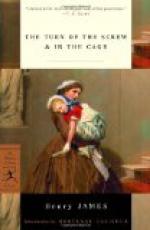It must be admitted that in spite of this brave margin an irritation, after he had gone, remained with her; a sense that presently became one with a still sharper hatred of Mr. Buckton, who, on her friend’s withdrawal, had retired with the telegrams to the sounder and left her the other work. She knew indeed she should have a chance to see them, when she would, on file; and she was divided, as the day went on, between the two impressions of all that was lost and all that was re-asserted. What beset her above all, and as she had almost never known it before, was the desire to bound straight out, to overtake the autumn afternoon before it passed away for ever and hurry off to the Park and perhaps be with him there again on a bench. It became for an hour a fantastic vision with her that he might just have gone to sit and wait for her. She could almost hear him, through the tick of the sounder, scatter with his stick, in his impatience, the fallen leaves of October. Why should such a vision seize her at this particular moment with such a shake? There was a time—from four to five—when she could have cried with happiness and rage.
Business quickened, it seemed, toward five, as if the town did wake up; she had therefore more to do, and she went through it with little sharp stampings and jerkings: she made the crisp postal-orders fairly snap while she breathed to herself “It’s the last day—the last day!” The last day of what? She couldn’t have told. All she knew now was that if she were out of the cage she wouldn’t in the least have minded, this time, its not yet being dark. She would have gone straight toward Park Chambers and have hung about there till no matter when. She would have waited, stayed, rung, asked, have gone in, sat on the stairs. What the day was the last of was probably, to her strained inner sense, the group of golden ones, of any occasion for seeing the hazy sunshine slant at that angle into the smelly shop, of any range of chances for his wishing still to repeat to her the two words she had in the Park scarcely let him bring out. “See here—see here!”—the sound of these two words had been with her perpetually; but it was in her ears to-day without mercy, with a loudness that grew and grew. What was it they then expressed? what was it he had wanted her to see? She seemed, whatever it was, perfectly to see it now—to see that if she should just chuck the whole thing, should have a great and beautiful courage, he would somehow make everything up to her. When the clock struck five she was on the very point of saying to Mr. Buckton that she was deadly ill and rapidly getting worse. This announcement was on her lips, and she had quite composed the pale hard face she would offer him: “I can’t stop—I must go home. If I feel better, later on, I’ll come back. I’m very sorry, but I must go.” At that instant Captain Everard once more stood there, producing in her agitated spirit, by his real presence, the strangest, quickest revolution. He stopped her off without knowing it, and by the time he had been a minute in the shop she felt herself saved.




